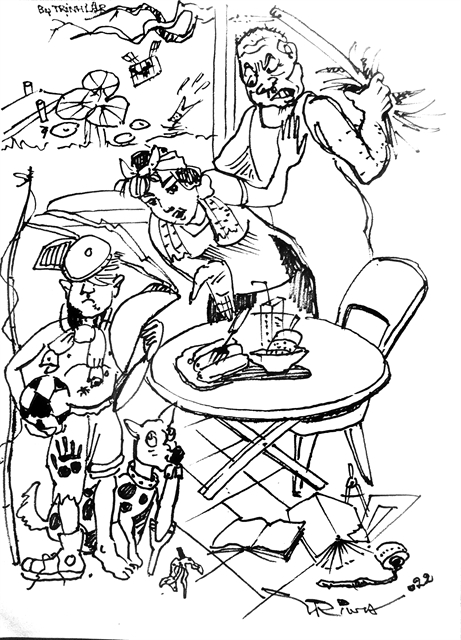 Talk Around Town
Talk Around Town

Becoming a parent is no easy task. One learns or tries to become what they think is a good enough parent according to circumstances, time and financial abilities.

|
| Illustration by Trịnh Lập |
by Nguyễn Mỹ Hà
Becoming a parent is no easy task. One learns or tries to become what they think is a good enough parent according to circumstances, time and financial abilities.
"Con không chê cha mẹ khó, chó không chê chủ nghèo," goes a Vietnamese saying that literally means children will never despise their parents for being impoverished, and a dog will never refuse a poor master.
If we can maintain the joy, the happiness we had when we saw our child for the first time in our life, the hope we looked at them with when we held them for the first time, then we'll slowly figure out how to get closer to their heart and share the pain they feel, which as parents we do not always understand.
How to raise a child to become a healthy person, both physically and mentally, to find the strength to find a job to support them, and to find a place in the sun, are all tough tasks filled with both burdens and joy.
Sometimes you can be open, kind and courteous with strangers but reluctant to talk warmly to your loved ones about your expectations, happiness, or sadness.
To be close but with a certain expectation, respectful yet emotional and with enough humour, is ideal for any such relationship.
But things are never perfect.
We have to deal with real, daily life situations when parents and children try their best, but things do not always work out quite as expected.
The gap between the expectations of children and parents can be too wide, and you can only close the distance if you start opening up and sharing what's on your mind.
I was quite perplexed in a practical psychology class 20 years ago, when a teacher said: "I have two daughters, one I get along with so well. I think everything she says is reasonable. But everything my other daughter says easily sends me into a rage."
Being a good parent in one child's eyes cannot always assure success with another child.
Parents are only human: we make mistakes, talk too much, or even become stingy when asked for money. And we get angry, sometimes with reason, sometimes without.
While parents are in control, with the money, the house, and the power, a child can feel dependent, voiceless and powerless, like they can never control their own lives.
If this is the case, life can become frustrating and unbearable for them. An angry, frustrated teenager who resents their parents for the treatment they have received can carry the scars for a long time, maybe all of their lives.
It is often said that when you become a parent, you understand how loving and caring your parents were, how they would sacrifice anything they had, even their lives, for you.
But until that moment comes, parents need to take steps to get closer to their children's minds and get them to speak up about their frustrations and resentment so that both sides can adjust and bridge the parent-child gap.
But things are difficult.
If a child wants to not be active in the house, they can retire to their room for privacy, where they have a bed to sleep in every day. But then, if they want privacy, they must take responsibility for the space.
But inevitably, it ends up the parent being the bad one, as they must nag their kids over and over again to clean up, like a broken record. Clean your room. Have you cleaned your room? Will you clean your room over the weekend, please? How about we clean your room together? I'll buy you a milk tea and some coke if you clean your room!
These sentences embody a parent's exasperated attitude as they give their children more authority over their territory. To be honest, I've tried them all. It worked once or twice, then the old messy room came back. The parent has gone from being an authority figure to being a stranger, then to engaging in barefaced bribery to get a job done.
But parents cannot kneel and beg to get a job done. We need to draw a line for our own dignity. In the end, it's our house, and we are the owners and responsible for its maintenance.
When yours truly thought it was becoming hopeless trying to get the child's room in shape, I found an article citing a Harvard University psychologist that says parents should not worry if their kid's rooms are messy as it's a sign of high IQ.
Further internet searches showed that Albert Einstein, Thomas Edison and Steve Jobs had incredibly messy desks and rooms, creative geniuses all!
Such examples would have helped me some time ago, but not anymore. Millions of messy desks and rooms worldwide, but three geniuses. Big deal.
As a last mocking attempt, with me desperately trying to laugh at my predicament, I sent a link to the article in our family group chat. Heart signs were given, especially by those with messy rooms.
Finally, we could all share a laugh at something which only caused quarrels and frustration before. All kids want to be smart, but even they know they need to get their rooms in shape.
A few days later, when I asked my kids when they had a day off to list a few things they would do during the day, "clean my room" was an answer. I couldn't believe what I had heard.
Family brings you happiness, yet the pain it brings can also be a lasting unpleasant feeling. If you try to find a way to laugh together more often, more conflicts will be resolved. At least we can hope so. VNS




